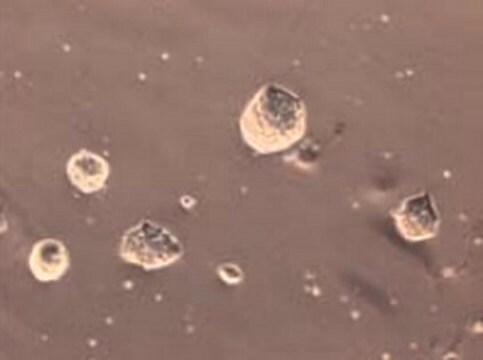SCM001
RESGRO Culture Medium, 250ml
The RESGRO Culture Medium is a specialty media that can be utilized to complement traditional murine Embryonic Stem (ES) cell culture media containing ESGRO murine LIF medium supplement.
Sinonimo/i:
Culture medium
Autenticatiper visualizzare i prezzi riservati alla tua organizzazione & contrattuali
About This Item
Codice UNSPSC:
12352207
eCl@ss:
32160801
NACRES:
NA.71
Prodotti consigliati
Livello qualitativo
Stato
liquid
Produttore/marchio commerciale
Chemicon®
tecniche
cell culture | stem cell: suitable
input
sample type induced pluripotent stem cell(s)
sample type: mouse embryonic stem cell(s)
Condizioni di spedizione
dry ice
Descrizione generale
RESGRO Culture Medium is a specialty media that can be utilized to complement traditional murine Embryonic Stem (ES) cell culture media containing ESGRO® murine LIF medium supplement. In contrast to routine ES cell culture using ESGRO supplemented medium, RESGRO Culture Medium is recommended for a number of specialized applications.
Applicazioni
Rescue of established ES cell lines
RESGRO Culture Medium has the capacity to rescue established ES cell lines that have started drifting, and either generate low percentage chimeras or have lost germline transmission capability. Differentiation, which is present in the ES cells but not visible with traditional medium, will become recognizable when using RESGRO Culture Medium. After 2 passages, a clear difference is seen between differentiated and undifferentiated ES cells, at which time undifferentiated cells can be selected for by sub-cloning.
Murine ES cell derivation
The efficiency of ES cell derivation is greatly strain dependent. To date, very few murine ES cell lines are available from inbred strains other than 129 strains, and those derived have generally been obtained with low success rates. Furthermore, ES cells derived from other strains than 129 are in general more difficult to propagate in vitro. Especially at high passage number and after genetic manipulation, these cell lines generate chimeras less efficiently and contribute less frequently to the germline.
RESGRO Culture Medium enables the efficient derivation and maintenance of ES cell lines from several inbred mouse strains, including certain strains that were previously considered to be non-permissive for ES cell derivation. A recent study demonstrated that RESGRO allowed the derivation of ES cell lines from inbred strains other than 129 (including FVB, a strain previously considered to be non-permissive for ES cell derivation and C57Bl/6N, BALB/c, 129/SvEv and DBA/2N mouse strains)1.
Culture of ES cells without a fibroblast feeder layer
RESGRO Culture Medium allows for the culture of ES cells on bare (gelatinized) culture dishes. Even in the absence of a fibroblast feeder layer ES cells maintain their undifferentiated character and their germline transmission capability for at least 5 passages, when cultured with RESGRO Culture Medium. After trypsinization pure ES cell suspensions without fibroblast cells can be obtained. Fibroblast cells will no longer interfere during blastocyst injections, diploid aggregations, tetraploid aggregations and electroporations.
The RESGRO Culture Medium is a specialty media that can be utilized to complement traditional murine Embryonic Stem (ES) cell culture media containing ESGRO murine LIF medium supplement.
Stoccaggio e stabilità
Upon receipt, RESGRO Culture Medium should be stored at -80°C until required for use. When stored properly, product is stable until the expiration date stated on the label. Once opened, the unused portion can be stored at 4°C for at least 4 weeks. Protect from light during storage. Avoid repeated freeze/thaw cycles.
It is recommended that the product be discarded following expiry. Be aware that the addition of certain supplements can effect product stability and characteristics.
Note: Turbidity and flocculent material may be present after thawing or after prolonged freezer and/or refrigerated storage.
We recommend that in case of flocculent material or turbidity, to use a GP Express Plus Membrane (Stericup from Millipore - ref. SCGPU05RE) in combination with a standard 70 mm fiberglass prefilter for 500 mL bottle top filters.
It is recommended that the product be discarded following expiry. Be aware that the addition of certain supplements can effect product stability and characteristics.
Note: Turbidity and flocculent material may be present after thawing or after prolonged freezer and/or refrigerated storage.
We recommend that in case of flocculent material or turbidity, to use a GP Express Plus Membrane (Stericup from Millipore - ref. SCGPU05RE) in combination with a standard 70 mm fiberglass prefilter for 500 mL bottle top filters.
Note legali
CHEMICON is a registered trademark of Merck KGaA, Darmstadt, Germany
ESGRO is a registered trademark of Merck KGaA, Darmstadt, Germany
PLURISTEM is a registered trademark of Merck KGaA, Darmstadt, Germany
Esclusione di responsabilità
Unless otherwise stated in our catalog or other company documentation accompanying the product(s), our products are intended for research use only and are not to be used for any other purpose, which includes but is not limited to, unauthorized commercial uses, in vitro diagnostic uses, ex vivo or in vivo therapeutic uses or any type of consumption or application to humans or animals.
Codice della classe di stoccaggio
10 - Combustible liquids
Classe di pericolosità dell'acqua (WGK)
WGK 1
Certificati d'analisi (COA)
Cerca il Certificati d'analisi (COA) digitando il numero di lotto/batch corrispondente. I numeri di lotto o di batch sono stampati sull'etichetta dei prodotti dopo la parola ‘Lotto’ o ‘Batch’.
Possiedi già questo prodotto?
I documenti relativi ai prodotti acquistati recentemente sono disponibili nell’Archivio dei documenti.
Marina Gertsenstein et al.
PloS one, 5(6), e11260-e11260 (2010-06-29)
Genetically modified mouse strains derived from embryonic stem (ES) cells have become essential tools for functional genomics and biomedical research. Large scale mutagenesis projects are producing libraries of mutant C57BL/6 (B6) ES cells to enable the functional annotation of every
Timothy J Davies et al.
Stem cells and development, 21(10), 1688-1700 (2011-09-22)
The derivation of pluripotent embryonic stem cells (ESCs) from a variety of genetic backgrounds remains a desirable objective in the generation of mice functionally deficient in genes of interest and the modeling of human disease. Nevertheless, disparity in the ease
Il team dei nostri ricercatori vanta grande esperienza in tutte le aree della ricerca quali Life Science, scienza dei materiali, sintesi chimica, cromatografia, discipline analitiche, ecc..
Contatta l'Assistenza Tecnica.







